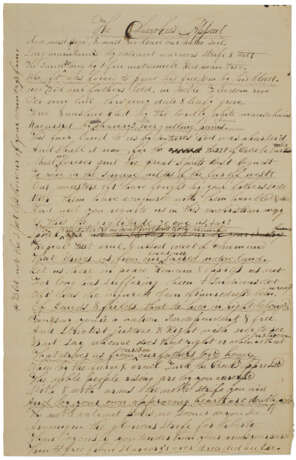ID 967461
Lot 261 | Protesting the removal of the Cherokee west of the Mississippi
Estimate value
$ 1 000 – 2 000
Two pages, 318 x 204mm.
An unattributed protest against Andrew Jackson's forcible removal of the Cherokee from their ancestral lands. A forty line poem, with numerous revisions to the text written by an unidentified author, possibly a student, written on behalf of the Cherokee, who in 1830 had become, together with numerous other Native American tribes remaining east of the Mississippi, subject to the Indian Removal Act of 1830. The Cherokee were one of the last to be forced off their lands in the late 1830s, most removing to “Indian Territory” in what is today modern-day Oklahoma. The anonymous author may have been inspired by a similarly titled poem that appeared in the 21 April 1830 issue of the Massachusetts Spy, but the text in the present manuscript is completely different and reads, in part, “And must we go, & must we leave our native soil / Long maintained by valiant warriors' strife & toil / The land so long by & free untrammeled Red man trod / who oft was forced to prove his freedom by his blood. / Once did our fathers bold, in noble freedom rove" Interestingly, yet another poem with the same title also appeared in the 1 June 1838 issue of the New Bedford Mercury. That both published poems appeared in Massachusetts newspapers and New England was a hotbed of opposition to the removal policy, would suggest the present manuscript was composed and written by someone in this region.
| Place of origin: | USA |
|---|---|
| Auction house category: | Letters, documents and manuscripts |
| Place of origin: | USA |
|---|---|
| Auction house category: | Letters, documents and manuscripts |
| Address of auction |
CHRISTIE'S 20 Rockefeller Plaza 10020 New York USA | ||||||||||||||
|---|---|---|---|---|---|---|---|---|---|---|---|---|---|---|---|
| Preview |
| ||||||||||||||
| Phone | +1 212 636 2000 | ||||||||||||||
| Fax | +1 212 636 4930 | ||||||||||||||
| Conditions of purchase | Conditions of purchase | ||||||||||||||
| Shipping |
Postal service Courier service pickup by yourself | ||||||||||||||
| Payment methods |
Wire Transfer | ||||||||||||||
| Business hours | Business hours
|



